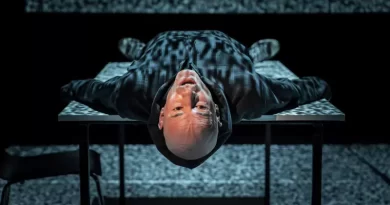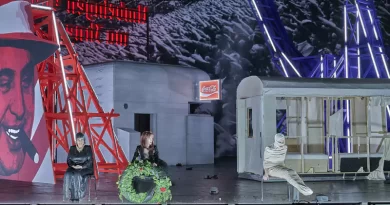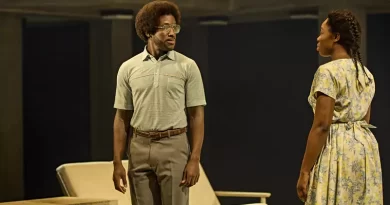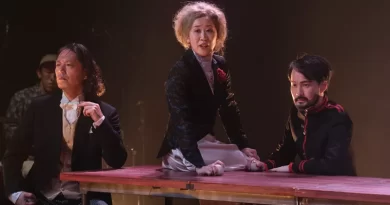Theatre World Brno Festival, Czech Republic
Dana Rufolo in the Czech Republic
3 June 2025
The Theatre World Brno Festival took place in Brno, Czech Republic, in mid to late May. I saw three of the productions: the elaborate multimedia show Quanta and two small intimate shows, known in English as Drain and By the River.
Quanta.
Photo credit: Marek Olbrzymek.
Quanta is a production by the Lithuanian National Drama Theatre and its director, Łukasz Twarkowski is Polish. The project is based on a play by Joanna Bednarczyk that was translated from Polish into Lithuanian.
Twarkowski is known for his multimedia productions and in Quanta he combines film, soundscape, dancing, acting, light displays and video inserts to create what he believes will be a visceral understanding of a quantum physical world for the audience. For instance, he uses film extensively by keeping the actors inside a space – a hotel called Les Moires somewhere in the Swiss alps – and projecting the filmed recording of their movements and words immediately above the stage set.
One wonders why we can’t directly access the interior of the hotel and see the actors live, but this technique is intended to show the split focus that characterizes a world in which nothing is still and nothing is linear. Twarkowski wishes to present quantum physics as a reality where everything, even time, exists in a sort of cloud, being everywhere at once. It isn’t particularly distinct from earlier multimedia performances of his that have nothing to do with science, and as such it is really an experiment that takes the audience on a trip into unfamiliar images of reality and of consciousness by having them experience unusual sensations.
The scene design by Fabien Lede with its art nouveau Swiss hotel exterior centre-stage is beautiful. We are back in 1938 at the hotel’s bar; we view it from the exterior while a screen that slides silently from the wings shows us a film of what is happening inside the bar and in the hotel rooms. The hotel is filled with physicists and their wives, among them Otto Hahn and Werner Heisenberg. They converse about time and memory. We hear the quote supposedly by Albert Einstein that the war fought after World War Three will be with sticks and stones. We hear Niels Bohr say that what is real is made up of things you cannot call real. Heisenberg says the more durable a thing is, the less life it possesses. Bohr and Heisenberg of course feature in Michael Frayn’s Copenhagen while Heisenberg is also in Farm Hall.
Simultaneity of film and stage action has become commonplace, almost prosaic, among young performance artists who grew up with the Internet and mobile phones that fragment information and deconstruct narrative, but here (given the nature of the dialogue) we are pushed to understand the multiple perspectives of reality that prompted Picasso to paint a face as a collection of features lying flat on a canvas and theoretical physicists to posit the theory that there is no vanishing point towards which an observer can turn; all of reality is not one connected symmetrical tableau.
Decades later, this same hotel – which has lost its art nouveau exterior and is now stark and austere – is where a young amorous couple, Alice and Bob, are staying. They seem to be the only guests. They are named after the two personages used by professionals when they wish to explain cryptographic transmission of messages to laypeople.
For me, the highlight of the performance was when Alice supposedly broke a wine glass, reproducing exactly an incident from 1938. The waiter sweeps up the fragments of glass and tells her to keep calm, using the precise words used by the earlier waiter. This is a powerful moment: we see the present recapitulate the past. It’s not, however, a particularly specific invocation of quantum physics. It is attention-catching in a genuinely theatrical way, and for a moment the fact that this scene is shown to us filmed instead of being acted live before our eyes is a minor distraction. The next line of dialogue, which is the couple asking the waiter if they are not alone, is also powerful dialogue. They are alone in the present, but the past is hovering in the background.
Quanta does not deliver a deepened understanding of quantum physics. It is a failed experiment, not least because loud bass sounds that far exceed the tolerable decibel level were emitted at intervals to show the shifting of time-space. The sound was so penetrating that the actual theatre building, the Janáček Theatre (Janáčkovo divadlo), a modern auditorium with excellent acoustics, shook on its foundations. Strobe lights infused the performance with an otherworldly sensation that was equally risky for audience members to experience. In all, it was more about representing the present (acted) moment in conjunction with representing the (subconsciously remembered) past than it was about quantum theory.

Drain.
Photo credit: Marek Olbrzymek.
The Slovak National Theatre presented Drain (Odliv in Slovak). It is written and directed by Lukáš Brutovský and is a timely political piece that uses amusing on-stage props and humorous costumes to lighten its sombre message that Slovakians are suffering from a brain drain. The youth go off to study in America (or so they had been doing – right now the situation is changing) or Western Europe – and they learn how to farm or do business or practice medicine in the American and Western way. They either never return to Slovakia or when they do the methods they have learned are out of place. The entire play is about the fragility of the national identity. With actors sliding down an oversized plastic snail and a first-aid rubber torso that students use to practise resuscitation (something the country needs) being embedded as the torso of a florid dressed-up mannequin, this wild bonanza on the theme of alienation is catching. And it hints that change is desperately needed.

By the River.
Photo credit: Bára Bachanová.
There is no tongue in-cheek about the desperation of the actors in By the River, directed by the German Christiane Pohle. Reminiscent of The Lower Depths by Maxim Gorky, the actors loll in front of a picket fence on the banks of a river, selling their bodies because they have nothing else to sell. There is still the chance of affection, maybe even love, and one male couple seems to be moving in that direction. There are constant threats that the area will be turned into a profitable building site, and books are floating in the river. Someone commits suicide. After wheeling and dealing among themselves, cut off from society and loathe to tread the bourgeois path anyway, the group of lonely individuals who hang around the river give their own party, dressing in outlandish costumes and gyrating to music in clumsy fashion. It is a cri de coeur.
Surprisingly, By the River originated in Vienna, which has exported high culture for decades. Schauspielhaus Wien produced it in collaboration with the Slovak National Theatre under the title Am Flus/Pri rieke. It is intended to be a reflection on the scene of 50 years ago when AIDS was rampant, but as a portrait of castaway humans sinking to rock bottom, it is timeless.










